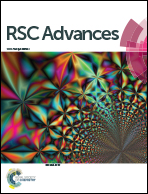pH dependent chemical stability and release of methotrexate from a novel nanoceramic carrier†
Abstract
Considering the pH dependent chemical stability of anticancer drug methotrexate (MTX), the present communication reports a new approach for intercalation of the same in a nanoceramic vehicle, magnesium aluminium layered double hydroxide (LDH), by ex situ anion exchange method at pH 7.00, using 0.3 M ammonium acetate solution for dissolution of the drug. This simple method ensures maximum stability of the drug at the above said pH, with no degradation byproduct (e.g., N10-methyl folic acid formed due to alkaline hydrolysis) under the given experimental conditions, compared to the similar approach, using 0.1 M sodium hydroxide solution, reported in our earlier work. Importantly, the above method leads to an enhanced drug loading of 32.3 wt%, compared to our previous reports. The cumulative release profile of MTX from LDH–MTX formulation in phosphate buffer saline (PBS) at pH 7.4 exhibited burst release initially which was taken care of by imparting a unique coating of poly(D,L-lactide-co-glycolide, PLGA) on the LDH–MTX nanostructure that reduces the toxicity due to local accumulation. Hence, the superiority of the above for use in cancer chemotherapy, over the conventional drug–polymer system has been established w.r.t the drug release profile and a possible hypothesis of the same has been suggested. The half maximal inhibitory concentration (IC50) of the MTX drug used in this study has been determined and the same has been used to estimate the time dependent (24, 48, 72 and 96 h) efficacy of the MTX loaded samples with/without polymer coating, on human colon tumour cells (HCT-116).


 Please wait while we load your content...
Please wait while we load your content...